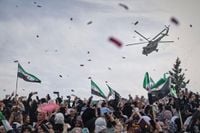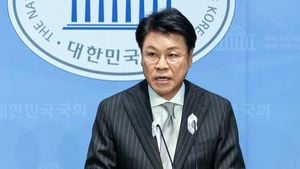On Saturday, March 29, 2025, Syrian interim President Ahmed al-Sharaa announced the formation of a new transitional government, marking a significant step in the country’s political evolution following decades of Assad family rule. The new cabinet is seen as a crucial move towards inclusivity, aiming to address the diverse ethnic and religious makeup of Syria and improve relations with the West.
The newly appointed 23-member Cabinet includes key figures such as Foreign Minister Assaad al-Shaibani and Defence Minister Mourhaf Abu Qasra, who will retain their positions from the previous interim government established after the ousting of Bashar al-Assad in December 2024. Anas Khattab, previously the head of general intelligence, has stepped in as the new interior minister, while Mohammed Yosr Bernieh has been appointed finance minister.
One of the most notable appointments is Hind Kabawat, a prominent opposition figure and member of Syria's Christian minority, who has been named social affairs and labor minister. Her appointment is particularly significant as she is the first woman to hold a ministerial position in this new transitional government. Kabawat has been a long-time advocate for interfaith tolerance and women’s empowerment, making her role a potential beacon for reform in the war-torn nation.
President al-Sharaa emphasized the commitment to “building a strong and stable state” during a speech marking the cabinet's formation. He stated, “We witness the birth of a new phase of our national journey,” underlining the government’s goal to rebuild public institutions and address the dire economic situation in Syria.
The cabinet’s formation comes amid increasing pressure from the West and Arab nations for a more inclusive government, especially following recent violence that resulted in the deaths of hundreds of Alawite civilians, a sect associated with the former regime. This violence, which occurred along Syria's western coast, has heightened calls for a representative civilian-led government.
In a bid to reflect the country’s diversity, the new government includes ministers from various backgrounds. Yarub Badr, an Alawite, has been appointed transportation minister, while Amgad Badr, a member of the Druze community, will lead the agriculture ministry. Additionally, Raed al-Saleh, the head of the White Helmets—an organization known for its humanitarian efforts during the civil war—has been appointed as the minister for emergencies and disaster management.
Despite these appointments, the government structure has raised concerns regarding the concentration of power. The transitional constitution, which was issued earlier this month, does not include a prime minister, placing significant authority in al-Sharaa's hands. This has sparked discussions among political analysts about the implications for governance and the potential for meaningful change in Syria.
Rim Turkmani, a senior research fellow at the London School of Economics, remarked on the need for a more distributed power structure, stating, “We need more than one person at the top.” She criticized the absence of a prime minister as a “missed opportunity” for effective governance and lobbying for sanctions relief.
The international community is closely monitoring the new government’s commitment to diversity and reform. U.S. and European officials have indicated that the success of this transitional government could influence the lifting of economic sanctions that have severely impacted Syria’s economy.
In his speech, al-Sharaa outlined the government’s main objectives, which include rebuilding state institutions, addressing economic challenges, and promoting fundamental rights and freedoms, including women’s rights and freedom of expression. These commitments are vital as Syria continues to grapple with the aftermath of a devastating civil war that has left millions in dire conditions.
As the new government takes shape, the situation remains precarious. The U.N. reports that approximately 90% of Syrians live below the poverty line, with millions facing cuts in food aid due to the ongoing conflict. The recent clashes and sectarian violence highlight the urgent need for stability and reconciliation among Syria’s diverse communities.
While the formation of this transitional government represents a step towards a more inclusive political landscape, the road ahead is fraught with challenges. Observers are watching closely to see how al-Sharaa navigates the complexities of governance in a country still reeling from years of conflict.
The formation of this government comes just ahead of Eid el-Fitr, which begins on March 31, 2025, a time traditionally associated with celebration and renewal. However, the shadow of recent violence looms large, with the U.S. State Department warning of potential attacks during the holiday, particularly targeting embassies and public institutions in Damascus.
As Syria enters this new chapter, the focus will be on whether the interim government can effectively address the pressing issues facing the nation and pave the way for a more stable and prosperous future.






